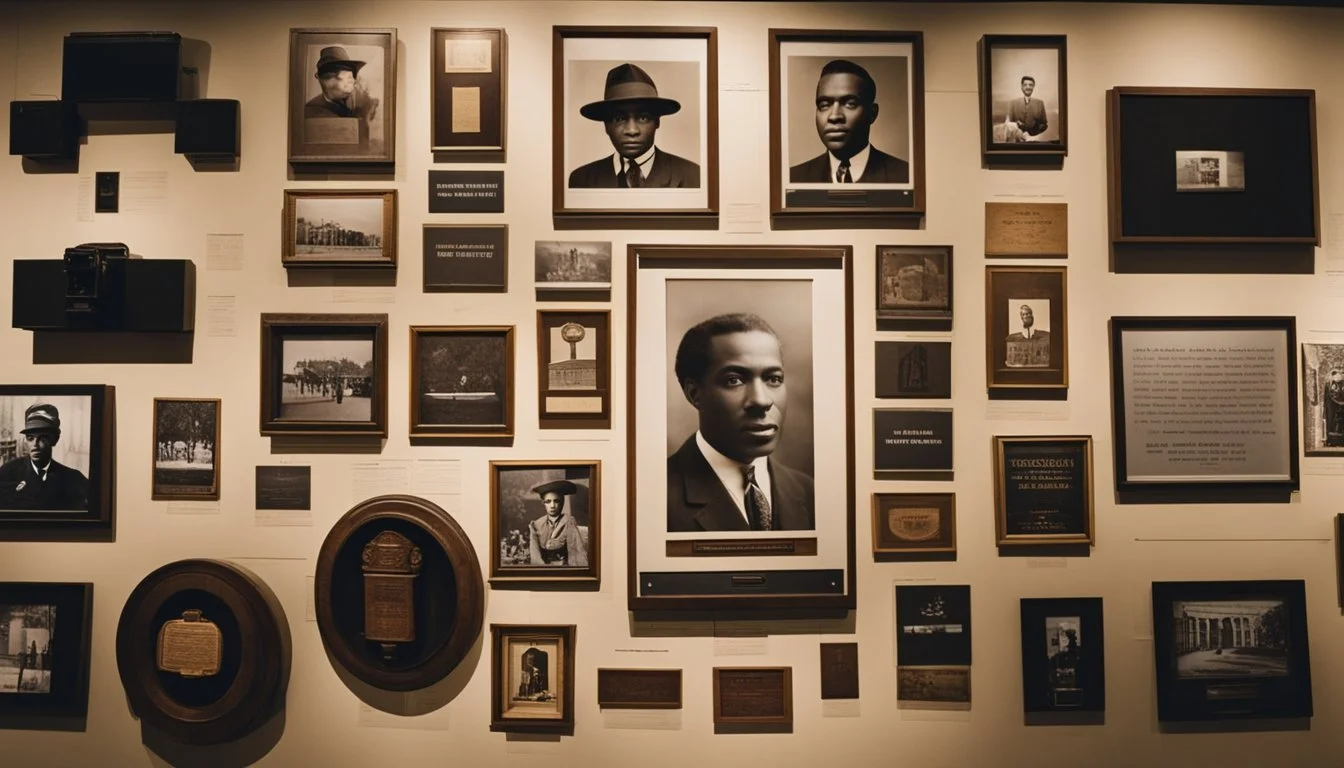Stanley Nelson: Documenting the African American Experience Through Film
Filmmaker Stanley Nelson has played a pivotal role in documenting the African American experience. Since graduating from the City College of New York in 1976 and starting his career with William Greaves, Nelson has focused on bringing pivotal Black stories to the screen.
His work often centers on critical moments and figures in the Civil Rights Movement. Notably, his films such as "Freedom Riders" and "Two Dollars and a Dream: The Story of Madame C. J. Walker" highlight both the struggles and achievements of African Americans in their quest for equality and success.
Through meticulous storytelling and a commitment to vérité style, Nelson's documentaries provide invaluable insights into the heritage and ongoing struggles of African American communities. This commitment has cemented his place as a crucial voice in the landscape of American filmmaking.
The Life and Career of Stanley Nelson
Stanley Nelson was born and raised in New York City. He graduated from the City College of New York in 1976. Early in his career, he secured an entry-level job with William Greaves, a pioneering Black filmmaker and producer.
Nelson’s work with Greaves marked the beginnings of his prolific career. By the mid-1980s, he had honed his skills in vérité storytelling and documentary filmmaking.
In 1987, he wrote and produced Two Dollars and a Dream: The Story of Madame C. J. Walker. This documentary highlighted the entrepreneurial journey of Madame Walker, who built a beauty empire serving African American women.
Over the years, Nelson has become one of the foremost chroniclers of the African American experience. His keen ability to convey powerful stories through documentary film has earned him a prominent place in nonfiction filmmaking.
Some notable works include Birth of the Cool, a look at the life of iconic jazz musician Miles Davis. This film premiered at the Sundance Film Festival in 2019, marking Nelson’s tenth premiere at the prestigious event.
Other significant films by him cover the Civil Rights Movement and its impact on American society. His work is known for its depth, precision, and ability to inspire and inform audiences.
Influences and Motivations
Stanley Nelson's journey in filmmaking began in earnest after graduating from the City College of New York in 1976. During this period, he secured an entry-level job with William Greaves, a renowned Black filmmaker and producer.
Nelson's collaboration with Greaves was pivotal. Greaves was not just a mentor but a significant source of inspiration. It was under Greaves' guidance that Nelson honed his skills and embraced the world of documentary filmmaking.
In 1987, Nelson wrote and produced "Two Dollars and a Dream: The Story of Madame C. J. Walker." This project allowed him to explore the rich narratives within the African American community. Highlighting Walker's journey of building a beauty empire, it underscored his commitment to capturing influential Black figures.
Nelson's own heritage and the broader African American experience have been central to his work. Growing up during the Civil Rights Movement and witnessing the fight for equality profoundly shaped his perspective. His films often reflect the strength and resilience of the African American community.
In 1998, Nelson co-founded Firelight Media with the aim of supporting emerging filmmakers of color. This initiative speaks to his dedication to diversifying the voices in documentary filmmaking. By fostering new talent, he's ensuring that the stories of underrepresented communities continue to be told authentically.
Nelson's verité storytelling approach is another key influence. This style, characterized by its observational technique, allows him to present stories with authenticity and depth. His commitment to this method ensures that the narratives he captures are both compelling and genuine.
Through his work, Nelson makes it clear that his motivations are deeply rooted in a desire to illuminate the multifaceted experiences of African Americans. The combination of historical context, personal heritage, and mentorship from figures like Greaves has indelibly shaped his impactful career.
Major Works and Documentaries
Stanley Nelson has directed numerous impactful documentaries that highlight pivotal moments and figures in African American history. His major works often explore themes of civil rights, social justice, and cultural identity.
The Murder of Emmett Till
Stanley Nelson's documentary, The Murder of Emmett Till (2003), investigates the brutal lynching of a 14-year-old African American boy in Mississippi in 1955. This film meticulously examines the events leading up to and following Emmett Till's murder, including the infamous trial and its aftermath.
Through interviews with Till's family and eyewitnesses, Nelson unveils the deep-seated racism in the American South at the time. The documentary played a crucial role in reigniting public interest and awareness about this tragic case and the impact it had on the Civil Rights Movement.
Freedom Riders
Freedom Riders (2010) documents the journey of over 400 civil rights activists who rode interstate buses into the segregated South in 1961. These activists, both Black and white, risked their lives to challenge the non-enforcement of Supreme Court decisions that ruled segregated public buses unconstitutional.
Nelson's film portrays the courage and determination of the Freedom Riders amidst violent opposition. Through archival footage and personal testimonies of the participants, the documentary vividly captures the spirit of these young activists and the significant role they played in the struggle for civil rights.
The Black Panthers: Vanguard of the Revolution
In The Black Panthers: Vanguard of the Revolution (2015), Stanley Nelson chronicles the rise and influence of the Black Panther Party during the 1960s and 1970s. The film delves into the party's formation, its community programs like free breakfast for children, and its confrontations with law enforcement and the federal government.
Nelson provides a nuanced portrayal of the Black Panthers, focusing on their activism and the challenges they faced. Interviews with former members and archival footage offer insights into the motivations behind the movement and its lasting impact on American society.
Documentary Style and Techniques
Stanley Nelson leverages a distinct vérité style to create an immersive experience for viewers. This approach emphasizes naturalism and authenticity, often eschewing scripted dialogue for real-life interactions. His works commonly feature interviews, archival footage, and narration to provide a multifaceted view of historical events.
He often integrates compelling personal stories with broader historical contexts. This technique helps to humanize large-scale social and political movements. Nelson’s documentaries are meticulous in historical accuracy and depth, shedding light on underexplored aspects of the African American experience.
Archival footage plays a crucial role in Nelson's storytelling. By using authentic video and audio recordings from the periods he explores, he adds a layer of credibility and emotional impact. These primary sources are often coupled with narrative voiceovers that guide the viewers through the timeline of events.
Interviews with key figures provide direct insight into the subjects of his documentaries. Whether through firsthand accounts of activists, community leaders, or historians, these interviews add a compelling dimension to the narrative.
A key component of Nelson's technique is the fusion of personal anecdotes with collective memory. This blend helps to create a nuanced and comprehensive portrayal of historical events, connecting individual experiences to broader societal changes.
Lastly, the use of re-enactments is sparing but effective. When employed, they help to visualize crucial moments that lack visual documentation, enhancing the viewer's understanding without compromising the factual integrity of the story.
Impact on African American History and Culture
Stanley Nelson's documentaries have played a pivotal role in educating the public and raising awareness about significant events and figures in African American history. His work underscores the resilience and achievements of Black individuals and communities while addressing social injustices.
Educational Relevance
Nelson's films have become essential resources in educational settings, providing a comprehensive look at African American history. Two Dollars and a Dream: The Story of Madame C. J. Walker, for instance, highlights the entrepreneurial success of one of America's first female self-made millionaires. His meticulous research and storytelling make these documentaries valuable teaching tools. They are frequently used in classrooms and educational programs to engage students and foster a deeper understanding of the African American experience.
Social Awareness and Activism
Beyond education, Nelson's work has significantly impacted social awareness and activism. His documentary on the Blinding of Isaac Woodard brought national attention to systemic racism and police brutality. These films often serve as catalysts for discussions on civil rights and social justice. By shedding light on pivotal events and issues, Nelson's documentaries inspire viewers to become more involved in advocacy and activism, driving change within their communities.
Industry Recognition and Awards
Stanley Nelson has received numerous accolades throughout his career, cementing his reputation as a leading documentarian. His work has been recognized by prestigious institutions such as the Emmy Awards, Peabody Awards, and the Sundance Film Festival.
Emmy Awards
Stanley Nelson has won several Emmy Awards for his compelling documentaries. His film "Freedom Riders," which explores the 1961 civil rights activists who challenged segregation in the South, won three Primetime Emmy Awards in 2011, including Outstanding Writing for Nonfiction Programming.
"Freedom Summer," another noteworthy project, brought him an Emmy for Outstanding Research in 2014. These awards highlight Nelson's ability to unearth and convey pivotal moments in American history through meticulous research and storytelling.
Peabody Awards
The Peabody Awards have also recognized Nelson's exceptional work in documentary filmmaking. His groundbreaking documentary "The Murder of Emmett Till" won a Peabody Award in 2003. This film brought renewed attention to the 1955 lynching of a 14-year-old African American boy and its impact on the civil rights movement.
In 2015, his film "The Black Panthers: Vanguard of the Revolution" was also honored with a Peabody Award. This significant recognition reflects Nelson's dedication to exploring complex historical narratives with depth and insight.
Sundance Film Festival
Nelson's films have made a significant impact at the Sundance Film Festival. "Freedom Riders" premiered at Sundance in 2010 and received critical acclaim, further establishing his reputation as a master storyteller.
His documentary "Jonestown: The Life and Death of Peoples Temple," which delves into the tragic 1978 mass suicide in Guyana, was also showcased at Sundance in 2006. These entries into one of the most prestigious film festivals underline Nelson's influence and the importance of his work in the documentary film industry.
Work Beyond Filmmaking
Stanley Nelson's impact extends beyond his acclaimed documentaries, reaching into teaching, mentorship, advocacy, and public speaking activities. These roles highlight his dedication to educating future filmmakers and advocating for African American stories and issues.
Teaching and Mentorship
Stanley Nelson has devoted significant time to teaching and mentoring emerging filmmakers. As a co-founder of Firelight Media, he established the Documentary Lab, a fellowship program supporting filmmakers of color. The program provides funding, professional development, and access to a network of industry leaders.
His efforts help underrepresented voices reach larger audiences. Nelson also lectures at various universities and film festivals, sharing his expertise and experiences. His focus on education helps maintain the richness and inclusivity of documentary filmmaking.
Advocacy and Public Speaking
Nelson is an active advocate for social justice and equality in media representation. He frequently speaks at conferences and public events, addressing disparities in the film industry. His talks often highlight the need for more diverse voices and stories in media.
Through his public speaking engagements, Nelson brings attention to historical and contemporary issues affecting the African American community. His advocacy efforts ensure that these critical discussions continue and inspire action and change.
Critiques and Challenges
Stanley Nelson's work has received both praise and criticism over the years. Critics sometimes argue that his documentaries, with their focus on the African American experience, may not fully encompass the multifaceted nature of Black life in America. This perspective suggests a need for a broader range of stories and voices within the historical context he explores.
Funding can be a significant challenge. Despite Nelson's established reputation, securing financial support for documentaries that address African American history and social issues is not always easy. The struggle for adequate resources can impact production timelines and the depth of research available.
Another challenge is the sensitivity of the topics Nelson covers. Documentaries on civil rights and social justice subjects can provoke strong reactions from viewers. Balancing historical accuracy with emotional impact requires a careful consideration of how stories are told and represented.
Audience reach is also a point of concern. While Nelson’s documentaries have been celebrated in academic and artistic circles, ensuring they reach a wider audience remains a challenge. Educational outreach and public engagement are crucial for maximizing the impact of his work.
List of Key Challenges:
Funding: Difficulties in securing financial backing.
Content Scope: Potentially limited portrayal of the African American experience.
Sensitivity: Handling provocative and emotional subjects.
Audience Reach: Expanding viewership beyond niche groups.
Legacy and Influence on Filmmaking
Stanley Nelson has etched his name in filmmaking by chronicling the African American experience.
Nelson's works have educated audiences about critical events in American history. His films such as "Attica" and "The Black Panthers: Vanguard of the Revolution" are significant for providing both historical details and personal narratives that engage viewers deeply.
Film Subject Matter "Attica" 1971 prison uprising "Two Dollars and a Dream" Life of Madame C. J. Walker "The Black Panthers: Vanguard of the Revolution" Black Panther Party
Using a vérité storytelling style, Nelson offers a raw and authentic look at his subjects. This approach has influenced many contemporary documentarians who strive to capture the truth of their subjects with similar depth and nuance.
Nelson's dedication to depicting African American history and culture has enriched the documentary genre. His work sheds light on stories often omitted from mainstream narratives, thereby expanding the historical canon and broadening public understanding.
In addition to his films, Nelson's role as a mentor has significantly impacted the filmmaking community. His guidance has helped aspiring filmmakers master the craft, thus perpetuating his influence on future generations.
Stanley Nelson’s legacy is reflected not just in his own works but also in the diverse voices he has inspired. His commitment to social issues and historical accuracy continues to shape the documentaries made today.






